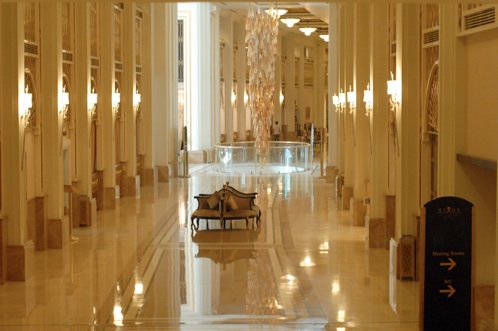By Richard John Charles Galustian.

Tripoli, 5 August:
With an 18,000-square-foot spa, helicopter service upon request the Rixos al-Nasr is Libya’s premier hotel. . . .[restrict]This five-star hotel in central Tripoli housed scores of foreign journalists during last year’s revolution. However, the journalists were forbidden from leaving the hotel without a marafiq, the Arabic word for companion – a genial euphemism for a minder.
In those days, Qaddafi government officials had turned the Rixos into something of a command centre, holding news conferences and anchoring state television broadcasts there. Some officials brought their families to the hotel to stay with them. This is also where, last year in March, Eman el-Obeidi burst into the hotel restaurant full of journalists and alleged that she had been detained and raped by government soldiers.
Arriving at the hotel prior to the elections, it soon became clear to me that the Rixos had been disfigured due to its recent misfortunes. It has, since the end of last year’s fighting, been rocked by a number of wretched incidents. Militia fighters stormed the 120-room oasis in the centre of the Libyan capital on 24 March when one of their senior commanders was asked to leave over an unpaid bill dating back to September 2011. According to a hotel employee, who witnessed the incident, the gunmen shot the air but rounds broke vases in the lobby. The militiamen then rushed off taking the Turkish hotel manager, ?ükrü Koçak, with them. Koçak was released after a few hours. But the damage was done – and not just to vases. Most of the hotel guests decamped.
More recently, in early May this year, two lawyers representing former hotel staff and militiamen filed a case against the hotel and two of its Turkish staff, the chef and store manager alleging food poisoning. Libyan police arrested the two accused after discovering expired food in the staff cafeteria. Koçak, the long-suffering hotel manager, was also arrested but released afterwards.
While Rixos staff waited for a trial, militiamen pressured hotel management to give each alleged victim LD 12,000 (approximately $9,300), say hotel sources. Death threats were also made against some of the hotel’s largely Turkish staff, according to Turkey’s Hürriyet daily. In early June, the majority of staff fled to Turkey. Tripoli was rife with inaccurate rumours that the food poisoning had led to deaths.
On July 3, a judge essentially found the hotel not guilty; well, just a little guilty! The defendants were given a choice by the judge to either spend three months in prison or pay LD 1,000 (approximately $775) each in fines to the Libyan government; in addition, there was a LD 70 fine to be paid by the hotel.
“These false claims explain in part why the Rixos is so empty,” the hotel’s sales manager, Sameh Hassan, told me. He added that, “We are less than half-full at the moment but are slowly getting a Libyan maintenance team in place and in days everything will improve.”
However, the Rixos continues to attract Libya’s elite. It is being regularly used by many NTC members and government ministers to host receptions and meetings and presumably will be used by members of the new National Congress and, when chosen, of the new government. The hotel also seems to be a favourite with foreign VIP delegations. US Senator,John McCain held private meetings with the US Ambassador to Libya and Libyan politicians on its premises on the day of the elections earlier this month.
In mid-August, the Turkish management is planning a full reopening. And perhaps, both Libya and the Rixos will be able to shed away the past and morph into a brighter future.
Jaqueline Schoen contributed to reporting [/restrict]









